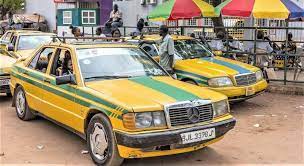An ongoing nationwide strike by commercial drivers in The Gambia has all but paralysed traffic for thousands of people who depend on them to commute in and around the country’s urban townships, APA can report from Banjul on Wednesday.
Since Monday, commercial drivers have responded to a call to ‘arms’ by The Gambia Transport Union over a welter of unaddressed concerns which had left its members aggrieved over what they see as the government’s lack of incisive action to tackle them.
Some of their grievances according to the transport union president Omar Ceesay are the rising cost of fuel, the increased tolls at the Senegambia Bridge in the border town of Farafenni and the proliferation of checkpoints throughtout the country’s motorable roads.
Since July this year, the pump price for fuel had gone up from D69.52 to D78.76 for petrol and from D64.78 to D73. 78 for diesel, leaving commericial drivers doubling up fares for commuters who complain that they are left bearing some of the brunt spinning from these ‘insane increases’.
From the capital Banjul to the sparsely populated township of Bakau and the sprawling urban metropole of Serrekunda and its surroundings, distraught commuters have been left at their wits’ end in the face of a shortage of commercial vehicles to take them to work or attend to businesses or social services.
Their only source of hope are a few random taxi drivers who do not seem to be falling into line as ordered by the GTU in a bid to force the government to negotiate and revise the fuel tariffs which have been ”gagging” their business.
They take advantage of the crisis caused by the strike to triple fares for stranded passengers who have no option but to acede to this if they are desperate enough to reach their destinations.
Many commuters never turned up for work or to their servie stations especially if they had to commute several routes to reach their destinations.
Meanwhile the Transport, Works and Communication ministry is stucking to its guns, insisting that the transport union should consider reining its drivers who in a bid to profit for the road misfortune of commuters have been wont to double fares far beyond the official tariffs.
As a result of the crisis, The Gambia Transport Service Corporation which commissioned some 50 new buses in June have entered the fray, expanding their rota and providing more mini-buses to transport commuters in routes where it has never ventured prior to the commuting chaos of the past few days.
However, these GTSC buses have so far been inadequate to effecting end the commuting woes of the public many of whom are critical of the transport union.
Critics of the transport union have accused Ceesay and his acolytes of ‘criminal economic sabotage’ in view of the state of paralysis to which their strike has ground economic activities to a halt.
Many without sympathy for the strikers say the government’s only answer to their action was to provide more transport fleets to address the perennial crisis faced by Gambia’s burgeoning commuters on a daily basis.
WN/as/APA


